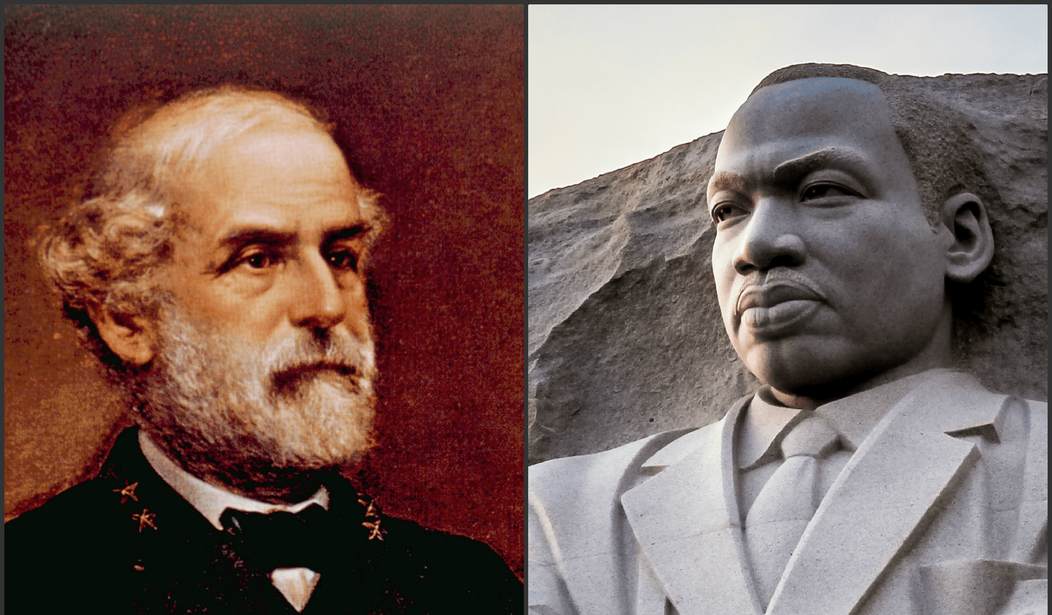On the third Monday in January, Arkansas, Alabama, and Mississippi celebrate a public holiday, but they don’t just commemorate Martin Luther King Jr. These three states also remember Confederate General Robert E. Lee. Arkansas Republican Governor Asa Hutchinson, however, has made a controversial effort to cut Lee off from the holiday.
“I think this provides our state an opportunity to bridge divides,” Hutchinson told the Associated Press (AP). He has vowed since early last year to make the change, and has presented it as part of his agenda for the legislative session which began last week.
Arkansas has celebrated Lee’s January 19 birthday since 1947, and King’s January 15 birthday since 1983. In 1985, the legislature voted to combine the holidays.
Lee remains one of the most magnetic figures of the Civil War. He chose to fight for the Confederacy despite his personal desire for the country to remain intact, and despite a tempting offer from the Union’s military. His prowess kept the South in the war far longer than expected, and earned undying respect among both North and South.
Nevertheless, there has been a nationwide re-evaluation of monuments and symbols from the Civil War and the Confederacy in particular. After the 2015 shooting at Emmanuel African Methodist Episcopal Church, pundits started attacking the Battle Flag of the Army of Northern Virginia, commonly known as the “Confederate Flag.” (The shooter, Dylann Roof, has been sentenced to death.)
In July 2015, the flag was removed from in front of the South Carolina State House. In Alabama, Governor Robert Bentley took down four Confederate flags on Capitol grounds. Southern Baptists voted against the flag in June of last year. When “White Lives Matter” activists protested at the NAACP in Texas last August, they prominently displayed the flag as a statement of racial heritage.
Last year, Arkansas Democrats announced they would remove the names of Thomas Jefferson and Andrew Jackson from their party’s annual fundraising dinner, echoing the decisions of other states also distancing themselves from these slave-owning presidents.
Some shot back against Gov. Hutchinson’s proposal to remove Robert E. Lee from the celebrations of Martin Luther King Day.
“It’s like telling our Hispanic neighbors that we’re not going to do Cinco de Mayo. It’s like telling the Irish we’re not going to celebrate St. Patrick’s Day,” Robert Edwards, commander of the Arkansas Division of the Sons of Confederate Veterans, told the AP. “I think it’s just a racist bill.”
Edwards is not alone. When the bill was first introduced two years ago, opponents filled a House committee room to speak out against the idea.
Meanwhile, some Democrats say they will not support the bill if it also sets aside a separate day to honor Robert E. Lee (some activists have pushed for a day in October, which would not be an official state holiday).
Democrat Representative Fred Love, who sponsored one of the bills separating Lee from MLK Day, told the AP he would not likely support Hutchinson’s proposal if it included a day for Lee.
“I don’t think my constituents would understand having a day that celebrates the head of the Confederate army that enslaved black folks,” Democrat Senator Linda Chesterfield, former chairwoman of the Legislative Black Caucus, told the AP. “But I think they truly will understand that it’s important for Dr. King’s day to be a stand-alone day.”
Some lawmakers questioned why any change is necessary. “We’re looking for a solution to a problem we don’t have,” Republican Representative Josh Miller said. “I haven’t noticed any humongous Robert E. Lee parades that are taking place in conjunction with Martin Luther King Day.”
There is a great deal of misunderstanding surrounding the Civil War. Thanks to a narrative about the “Lost Cause,” many valorize the Confederacy as a movement for freedom against alleged Union tyranny. In reality, the succession movement was inspired by fears that Abraham Lincoln’s Republican Party would restrict the spread of slavery into the United States territories — the central issue of the 1850s.
The Civil War was not entirely about slavery, but it is also false to say slavery was not an issue. Soldiers on both sides fought for God, family, and country, and Abraham Lincoln’s primary goal was not the eradication of slavery but the preservation of the Union. His very Emancipation Proclamation makes this clear — while the document is praised today, it did not free a single slave. It only declared that slaves in lands controlled by the Confederacy were free.
Because of Lee’s prowess and importance in prolonging the war, he does deserve to be remembered, and it is not racist or pro-slavery to say so. Americans must be careful not to wipe away their memory of history in the name of anti-racist, sexist, and other “social justice warrior” causes.
Already, a lack of historical knowledge has left many American college students ignorant of the fact that slavery was a universal human institution — not a uniquely American sin. Cries for the removal of William Shakespeare from the curriculum at Yale and the dropping of requirements on American history — for history majors — show that American universities are rushing headlong into a politicized ignorance of the past.
Separating Robert E. Lee from MLK Day would likely be a step forward, as Governor Hutchinson suggests. But Americans should not forget their history or rewrite it to unthinkingly condemn great figures like Robert E. Lee as supporters of slavery. History is more complicated than that.









Join the conversation as a VIP Member